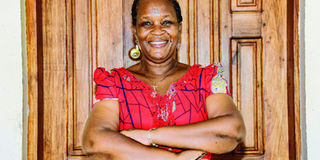A boss manages; a leader inspires...says Edwick Mapalala

Edwick Mapalala
What you need to know:
- Mrs Mapalala challenges fellow women to ‘think big, start small to avoid dependency.’ She says she is passionate about supporting and working with children and other vulnerable groups to improve their wellbeing, and build resilience. She has been doing for 20 years now.
The Citizen reporter SALOME GREGORY meets Mrs Edwick Mapalala, who is the country director for Regional Psychosocial Support Initiative (Repssi). Mrs Mapalala challenges fellow women to ‘think big, start small to avoid dependency.’ She says she is passionate about supporting and working with children and other vulnerable groups to improve their wellbeing, and build resilience. She has been doing for 20 years now.
In her roles at Repssi Tanzania, she - among other things - facilitates pyschosocial and parenting support. In her leadership journey, she is grateful to Fr Richard Bauer because the latter gave her opportunities to grow her talents and capability to offer services to others.
Below are excerpts from an interview with her. Read on...
What is your personal story?
I grew up with a mother who was a strong leader, very loving and caring. My mother believed in hard work and nurturing relationships. Our home always had visitors coming for advice. She was also very strong in her faith and prayer life. She strongly believed in God. She taught me how to pray and have a good relationship with God and people as well.
How and when did your leadership journey start?
It’s thanks to my husband, Bernard, who strongly supported me and encouraged me to join into social work. At first, I didn’t understand why he emphasized I could make a good social worker. I also thank my supervisors in different organisations that I worked with. They were good mentors to me and supported me to grow through word of encouragement and correction. At Repssi, where I work now, my boss used to tell me ‘don’t allow yourself to be associated with failure’. These words encouraged me to work hard and to care for others. I have always been lucky to have good supervisors in my career path. I had a desire to do the best always and this motivated me to study and read a lot as I also learnt from others.
Please tell our esteemed readers about the worst experiences that have happened in your leadership journey and how you addressed them?
There was a time I was locked in the office by a client who was demanding services in a way that did not following organisation’s policies. The client had mental health problems. I was scared but my managers and other staff helped me to overcome the fear. I always stress following the organisation’s policies and procedures to be safe when providing services to clients.
What is your leadership style?
As a leader, I believe in democratic and coaching styles mainly because my bosses used these two methods - and I was able to grow professionally. However, there are times when authoritarianism is used to get things moving.
Many people may have struggled with finding a mentor or support to help them in their career journey. Did you ever receive any form of support or mentoring as you moved along?
I have always had good and caring mentors - and they all helped me grow and become strong.
What do you think is the best strategy to sustain women empowerment initiatives to last into posterity?
At Repssi, we believe that women empowerment should aim at enhancing self-esteem and self-confidence in them. Once this is there, they will be able to participate in development and decision-making processes. Families and communities should build resilience for girls to enable them become strong and able to thrive when they face challenges. Leadership is not always easy; there are challenges. They should learn to see opportunities in each difficulty, rather than just give up when challenged.
Are you mentoring other women as well?
Yes, definitely, as a way of my appreciation. I work with some of them, others are from my social network and the community. I don’t want to see any woman suffering or idle, saying ‘I don’t have a job’. I always say a woman should be innovative and we can do a lot of things that way.
What about formal training?
Formal training is important, yes. I have done that myself. But also informal training helps a lot.
For those who want to be leaders: do you advise them to get any formal training?
Yes, they should. But, most importantly: they should have leadership qualities. Getting formal training if you are not a leader-material won’t work. Bosses manage their employees, while leaders inspire them to innovate, think creatively - and strive for perfection. Every team has a boss; but what people really need is a leader who will help them achieve greatness.
Next March, Mwananchi Communications Ltd’s business flagship brand, ‘The Citizen’ - working in partnership with organisations that envision a world where gender equity advances opportunities for all - is running the second edition of ‘Rising Woman Initiative 2021’. What do you think is causing the lack of diversity in top leadership?
There were some cultural practices that led to this. Women were not given equal opportunities. Parents are now changing tack, giving their children opportunities. It is a challenge in some tribes, though. Why are women not rising to the top? There is a need for change of mind set and socialisation that women can also be good leaders.
What can women do to take these matters into their hands?
Whenever you are given an opportunity, do your best, so that people can see that women are able to do. Also as mothers, let’s groom our daughters to be leaders. Lets do this as role models.
You are a very vibrant and bold leader. How did you develop this leadership confidence - and voice?
There were many people who supported me. My parents, my teachers, my siblings, my husband, my works mates. You can be appointed to lead a team; but, if the team rejects you, it becomes difficult to get on. I have always appreciated the fact that people are unique - and I learnt to accept each person in my team for what they are, and learnt how best to get along with them. No one is perfect; but always aim to do the best.
Can you tell us more about ‘self-care’ - and how do you accomplish it as a leader?
Reppsi emphasizes self-care and care for others - being a psychosocial organisation that emphasizes the wellbeing of people. I make sure my prayer time is not interrupted. I have time to rest and time for the family. My family will always be there for me. Time for work: I make sure I work hard. Time to be home - and I go home. I also make sure I participate in social programmes in my community. I encourage this for my team as well. We also teach other professionals on self-care to avoid burnouts.
Looking back: what three pieces of advice do you have for the younger generation?
Love you work, be a team player and play fair, avoid causing pain to others also don’t accept failure. Challenges should make you strong and positively change your life.
Repssi believes resilience can be build parents - and, as caregivers, they should support their children to grow with confidence. You cannot grow alone; you grow with others. The value of indigenous knowledge will strengthen social connectedness. We must have social energy and emotional intelligence for the development of our nation and the world.



